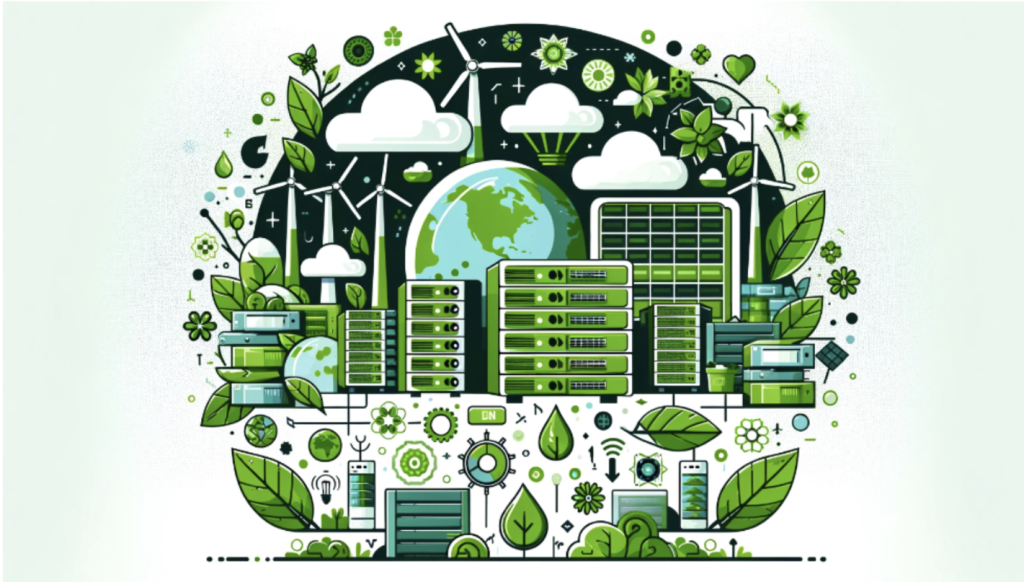In an age where brands must prioritize eco-friendliness and adapt to meet consumers’ growing environmental awareness, it is crucial for companies to adopt sustainable practices and communicate a true commitment regarding positive environmental impact. Although this may be an abstract concept for brands pursuing digital ways, they must reduce the gap between the intangible nature of services and the very tangible environmental concerns of their users. Often, the data centers, cloud storage, and algorithms are not obvious and even understood by consumers [1]. By combining environmentally friendly, ethically sound, and economically viable efforts, businesses can grow responsibly and boost their brand image. These strategies are vital for companies who target Generation Z or younger audiences, defined as digitally literate and engaged online. green digital marketing practices for your business

Before jumping into the subject, let’s make a clear distinction between sustainable marketing, green marketing, and green digital marketing. Although these concepts are interconnected, they have a unique focal point and approach. Sustainability marketing takes a broader lens, encompassing social, economic, and environmental aspects by promoting responsible business practices, community engagement, and long-term viability, as mentioned further above. Green marketing concerns minimizing a product’s or service’s environmental impact and encourages eco-friendly alternatives to consumers seeking sustainable choices. Green digital marketing merges both concepts with digital tools, using online platforms and data-driven strategies to effectively advocate sustainable products and initiatives, while also highlighting a business’ environmental commitments [2].
Approaches to Practice Green Digital Marketing
Green web hosting is using renewable sources to power data centers. These renewable sources originate from solar, hydro, or wind energy. This reduces the carbon footprint of websites as they use clean energy and are environmentally responsible. By neglecting fossil fuels, companies diminish operational costs. In addition, several green web hosting companies like GreenGeeks, A2 Hosting, DreamHost, and HostPapa [3], participate in carbon offsetting activities where they invest in carbon emission reduction projects. Brands can therefore guarantee contributing to a cleaner and sustainable future, while maintaining performance and reliability normally provided by traditional hosting services.
Green search engine optimization (SEO)[4] incorporates eco-friendly strategies to enhance website performance and reduce environmental impact. A key aspect is local SEO, which minimizes CO2 emissions by targeting nearby audiences and collaborating with local businesses. This reduces the need for long-distance travel and transportation-related emissions [5]. In addition to supporting sustainable consumption habits, it enhances user experience by helping customers find relevant, local content quickly. Ultimately, this approach aligns green digital marketing efforts with environmentally conscious values, benefiting both your business and the planet.
Sustainable marketing software minimizes the energy needed to load and run websites by implementing fast-loading features, image compression, and efficient coding practices. Elements like browser caching, minimalist design, and high-quality, timeless content reduce the need for frequent updates [6]. Additionally, eco-friendly content production and promoting mobile browsing can further decrease data usage and the associated energy consumption which aligns digital strategies with eco-conscious business practices. This approach helps brands lessen their carbon footprint, while enhancing user experience and site performance.
By purchasing Renewable Energy Certificates (REC) [6], companies can amplify their eco-friendly values alongside their customers, while also meeting government-mandated green energy requirements. All in all, a REC is a certificate proving the benefits of generating one megawatt-hour of renewable electricity. REC allows companies to offset the carbon footprint of their digital activities and display their sustainable commitment online [7]. This strategy also reinforces their platforms’ traceability, security, and accessibility. Moreover, this move fosters a deeper connection with eco-conscious consumers and strengthens a company’s reputation.
What about AI for Green Digital Marketing?
Using Artificial Intelligence (AI) for digital marketing is one of the pioneering innovations of the century [8]. By integrating AI, businesses can optimize digital processes, while still enhancing sustainability. AI plays a key role in reducing unnecessary resource consumption and lowering the carbon footprint associated with digital advertising. Whether it’s through efficient analysis of large datasets or smarter ad placements and targeting, AI ensures a smoother, and data-driven decision that contributes to both performance and environmental responsibility.
Furthermore, AI can aid in making informed and sustainable decisions about customer preferences, trends, and behaviors in real time due to its efficiency in processing data quickly and to its valuable insights. In that sense, brands can effectively tailor their ad campaigns to meet demands. Chatbots are also an interesting solution to cut down on the carbon footprint associated with customer service operations like traditional call centers. AI allows companies to align marketing strategies with vast sustainability goals as it is a modern and data-driven approach. Concisely, AI empowers digital marketing to evolve into green digital marketing because it simultaneously drives businesses to grow and to reduce their ecological impact.

Benefits of Adopting Eco-Friendly Digital Marketing
Embracing green digital marketing approaches offers a strategic advantage for companies. By aligning growing consumer demand for sustainability and environmental responsibility, brands can foster trust and deepen customer loyalty. This commitment enhances brand image, market positioning, and ultimate reputation. Prioritizing transparency [9] and promoting environmental efforts resonates with eco-conscious consumers seeking for brands caring for the planet. Forming connections with partners sharing similar principles amplifies the message and creates a powerful network that drives collective impact [10]. Incorporating green digital marketing supports business growth and communicates a genuine commitment to a healthier, more sustainable future [11].
Sources
[1] Hari K. “Understanding Sustainability in Digital Marketing .” Linkedin.com, 21 Aug. 2024, www.linkedin.com/pulse/sustainability-digital-marketing-trends-predictions-2025-hari-k-ath8c/. Accessed 12 Nov. 2024.
[2] Alkhatib, Sewar, et al. “Green Marketing in the Digital Age: A Systematic Literature Review.” Sustainability, vol. 15, no. 16, 1 Jan. 2023, p. 12369, www.mdpi.com/2071-1050/15/16/12369, https://doi.org/10.3390/su151612369.
[3] Kromerovas, Ignas. “Best Green Hosting – Eco-Friendly Hosting Providers (2022).” CyberNews, 8 Feb. 2022, cybernews.com/best-web-hosting/green-web-hosting/.
[4] Jones, Genie. “Green SEO: What Is It and Why Is It Important?” InLinks, 7 July 2022, inlinks.com/insight/green-seo-what-is-it-and-why-is-it-important/. Accessed 12 Nov. 2024.
[5] Cosper, Caleb. “Green SEO: Eco-Friendly Strategies for Optimizing Your Site .” RicketyRoo Inc, 26 Aug. 2024, ricketyroo.com/blog/green-seo-101 /. Accessed 12 Nov. 2024.
[6] West, Taylor. “Sustainable Digital Practices: Green SEO and Marketing – v Digital Services.” V Digital Services –, 13 May 2024, www.vdigitalservices.com/sustainable-digital-practices-green-seo-and-marketing/.
[7] Blok, Andrew. “Renewable Energy Certificates: How Anyone Can Enter the Green Energy Market.” CNET, 2 Nov. 2023, www.cnet.com/home/energy-and-utilities/renewable-energy-certificates-how-anyone-can-enter-the-green-energy-market/.
[8] Uncuta, Pavel. “Discover Thousands of Collaborative Articles on 2500+ Skills.” Linkedin.com, 14 Feb. 2024, www.linkedin.com/pulse/ai-sustainability-shaping-eco-friendly-marketing-pavel-uncuta-ypq. Accessed 12 Nov. 2024.
[9] Popov, Evgeny. “The Demand for Sustainability in Marketing and Advertising.” Forbes, 4 Nov. 2024, www.forbes.com/councils/forbestechcouncil/2024/11/04/the-demand-for-sustainability-in-marketing-and-advertising/.
[10] Bansal, Deepak. “Sustainable Marketing: How Brands Can Promote Eco-Friendly Practices.” Forbes, 15 Oct. 2024, www.forbes.com/councils/forbesbusinesscouncil/2024/10/15/sustainable-marketing-how-brands-can-promote-eco-friendly-practices/.
[11] Leighton, Nick. “Council Post: Sustainability in Marketing: How Going Green Can Be More than Just a Buzzword.” Forbes, 12 Aug. 2024, www.forbes.com/councils/forbescoachescouncil/2024/07/30/sustainability-in-marketing-how-going-green-can-be-more-than-just-a-buzzword/.
Claire Henry. “7 Google Analytics Strategies to Reduce Your Website’s Carbon Footprint.” Marketing Numérique | Digital Marketing | HEC Montréal, 14 Nov. 2023, digital.hec.ca/en/blog/energy-saving-web-solutions/ . Accessed 12 Nov. 2024.
